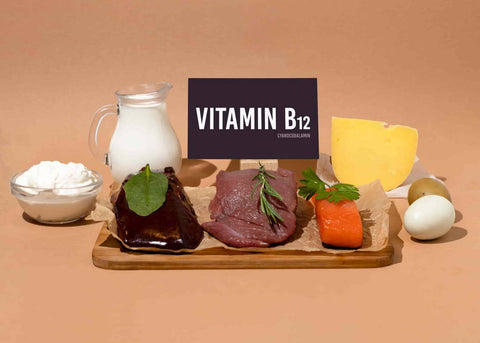
Vitamin B12: The Essential Nutrient Your Child Might Be Missing
Product Recommendations
Methylated Multivitamin
$42.00
- Methylfolate, Active B12, Energy-Supporting Nutrients
- Cognition-Aiding, Methylation-Promoting Ingredients
- 3rd-Party Tested for Purity, Potency & Safety
- Methylated Multivitamin Pack Upgrade Option

Written By:
Katie Stone - Naturopath
Medical Reviewer:
Dr. Nare Simonyan - PhD Pharmaceutical Science
Edited By:
Kari Asadorian - BSN, RNUpdated On:
June 03, 2025Why vitamin B12 is essential for children
B12 vitamin benefits go well beyond many other nutrients. This powerful vitamin plays an integral role in DNA synthesis, methylation reactions, and maintenance of genomic stability. In children, Vitamin B12 is essential for brain development, neural myelination, and cognitive function.
Folate, vitamin B12, and iron play crucial roles in erythropoiesis (formation of new blood cells).2 Erythroblasts are made in the bone marrow and are an intermediate in the initial stage of red blood cell formation. They require folate and vitamin B12 for proliferation during their differentiation.
B12 is also key to the methylation process that converts folic acid to active folate. It is also required for producing methionine synthase, which in turn is required for the production of S-adenosylmethionine (SAMe). SAMe is a vital methyl donor for neurotransmitter synthesis and cellular maintenance.3
A child’s B12 status during their first year of life is largely dependent on how much B12 they received while in the womb. In fact, one of the main causes of vitamin b12 deficiency in children is being breastfed by mothers who are also B12 deficient.4
Babies and children who don’t receive enough B12 during their early years are at higher risk of poor cognitive development due to reduced function of the central nervous system. Deficiency in early childhood is a major cause of neurodevelopmental delay and regression.5
It should also be noted that children can be low in B12 and still have normal vitamin B126 levels without showing the typical symptoms of megaloblastic anemia or neuropathy.
Symptoms of vitamin B12 deficiency
A vitamin B deficiency in children (under 19 years) is defined as a serum B12 value of < 229 pmol/L or a MMA value > 0.26 to 0.29 ųmol/L.7
However, only around 1–2% of an oral dose of B12 is absorbed through the gut, which means supplements containing the ‘recommended dosage’ will not provide anywhere near the desired amount. A higher dose is therefore essential. Studies show that high oral doses of vitamin B12 supplements are as effective as B12 injections when it comes to restoring low levels.8
Symptoms of vitamin B12 deficiency in children will usually appear between the ages of two months to 12 months.9
Severe B12 deficiency can lead to megaloblastic anemia, in which red blood cells are too large, abnormally shaped, and low in number. This can be life-threatening in children.
Neurological abnormalities (including regression and/or seizures) can also result from prolonged B12 deficiency.
Severe symptoms may include:
- Delay or regression of developmental milestones
- Loss of appetite or difficulties with feeding
- Hyperirritability
- Failure to thrive
- Hypotonia (decreased muscle tone)
- Lethargy
Early signs may include:
- Pallor (pale skin)
- Jaundice (yellowing of the skin and whites of the eyes)
- Bruising
(Note: If your Google searches have left you wondering, “Can vitamin b12 deficiency be a sign of cancer?”, you’ll be relieved to know that no, it is not. However, B12 deficiency can develop during cancer treatment, and may increase the risk of gastric cancer in adults.)
Food sources of vitamin B12
Humans cannot make vitamin B12 in the body - we need to source it from food or supplements.
Because Vitamin B12 is made by bacteria that live in the soil, the only dietary source of B12 for humans is from animal products. Animals acquire their B12 by eating plants that grow in this soil, or (in the case of fish) from phytoplankton that have a symbiotic relationship with bacteria.
It’s vital to include plenty of vitamin B12 foods in your child's diet. Red meat, fish, shellfish, poultry, eggs, and dairy products are the richest sources.
(Note: If your Google searches have left you wondering, “Can vitamin b12 deficiency be a sign of cancer?”, you’ll be relieved to know that no, it is not. However, B12 deficiency can develop during cancer treatment, and may increase the risk of gastric cancer in adults.10)
The best food sources of B12 include:
- Liver
- Clams
- Fish: salmon, trout, tuna
- Lean beef
- Dairy: Greek yogurt, milk
- Eggs
- Chicken breast
Vegan and vegetarian families are at higher risk of B12 deficiency due to a lack of B12 in the diet. A systematic review of 40 research studies found that the prevalence of deficiency among infants in vegetarian families is around 45%, and up to 33% in children and adolescents. Deficiency among pregnant women ranged from 17-39%, depending on the trimester.11
Vitamin b12 foods for vegetarians may include fortified cereals, nutritional yeasts, and non-dairy milks. However, fortified foods typically provide only small amounts of dietary B12, and usually in the cyanocobalamin form (which is synthetically made and not the ‘active’ form). In addition, the B12 content may be denatured by light and heat, and is unlikely to support overall needs.
It should also be noted that B12 levels take around two years to become seriously depleted, and won't be restored by short-term changes in the diet. Maintaining healthy B12 levels therefore requires eating plenty of B12-rich foods every day.
Supplementing with vitamin B12
If your child has a B12 deficiency or is at risk of deficiency due to a plant-based diet, supplementation is crucial. Supplements can help reduce risks to their short-and long-term health, provided they are accompanied by foods rich in vitamin b12.
Supplementary vitamin b12 for kids is available in the form of tablets, pills, powders, and liquids. In extreme cases, vitamin b12 injections may be necessary.
Vegetarian or vegan mothers who are breastfeeding will need to supplement with B12 to provide enough for herself and her child. The recommended B12 vitamin dosage for breast-feeding mothers is 2.8 mcg a day.12
It’s highly recommended that you talk to your health professional about the best vitamin B12 supplement for your needs. An excellent option is Methyl-Life® B-Methylated-II, which contains both L-Methylfolate and Methylcobalamin, the active form of B12. Folate works alongside B12 to support healthy methylation and nervous system support, and is recommended for all pregnant or breastfeeding women to prevent cognitive abnormalities.13
Children can start taking B12 supplements from around a year old. The recommended dosage for ages 1-3 years is 0.9mcg, ages 4-8 years is 1.2mcg, and 9-13 years is 18 mcg.14
Sublingual forms of B12 are an even better option as the highly vascular tissue of the mucous membrane in the mouth allows the vitamin to be absorbed directly into the bloodstream.
This is why Methyl-Life’s® Chewable Methylated Multivitamin is in a chewable form. It’s also popular with kids as it tastes good enough to be a treat! Best of all, it contains both active folate (as L-Methylfolate) and active B12, plus a wide range of highly bioavailable cognitive nutrients. Talk to your health professional about the appropriate dosage for your child.
The takeaway
Children must have vitamin B12: it’s that simple. B12 is a vital part of the processes that contribute to their development, especially the development of their brain and nervous system.
Including plenty of B12-vitamin foods in a child’s diet is essential, and this alone should be enough to support their needs. However, moms and children who eat vegan or vegetarian diets will need extra support in the form of B12 supplements. It’s highly recommended that vegan or vegetarian families talk to their healthcare practitioner about a vitamin B12 supplement if they have any concerns about their child's Vitamin B12 intake.


Product Recommendations
Chewable Methylated Multivitamin - L-Methylfolate + Active B12 - MTHFR/Pregnancy/Children
$42.00
- Methylfolate, Active B12, Energy-Supporting Nutrients
- Cognition-Aiding, Methylation-Promoting Ingredients
- 3rd-Party Tested for Purity, Potency & Safety
- Methylated Multivitamin Pack Upgrade Option
References
-
Bernadette N Ng’eno, Cria G Perrine, Ralph D Whitehead Jr, Giri Raj Subedi, Saba Mebrahtu, Pradiumna Dahal, Maria Elena D Jefferds; "High Prevalence of Vitamin B12 Deficiency and No Folate Deficiency in Young Children in Nepal"; Nutrients; 2017 Jan
https://www.ncbi.nlm.nih.gov/pmc/articles/PMC5295116/
-
Mark J Koury, Prem Ponka; "New insights into erythropoiesis: the roles of folate, vitamin B12, and iron"; Annual review of nutrition; 2004
https://pubmed.ncbi.nlm.nih.gov/15189115/
-
Rima Obeid; "The Metabolic Burden of Methyl Donor Deficiency with Focus on the Betaine Homocysteine Methyltransferase Pathway"; Nutrients; 2013 Sep
https://www.ncbi.nlm.nih.gov/pmc/articles/PMC3798916/
-
Patrícia Lipari Pinto, Cristina Florindo, Patrícia Janeiro, Rita Loureiro Santos, Sandra Mexia, Hugo Rocha, Isabel Tavares de Almeida, Laura Vilarinho, Ana Gaspar; "Acquired Vitamin B12 Deficiency in Newborns: Positive Impact on Newborn Health through Early Detection"; Nutrients; 2022 Oct
https://www.ncbi.nlm.nih.gov/pmc/articles/PMC9607322
-
Brahim El Hasbaoui, Nadia Mebrouk, Salahiddine Saghir, Abdelhkim El Yajouri, Rachid Abilkassem, Aomar Agadr; "Vitamin B12 deficiency: case report and review of literature"; The Pan African medical journal; 2021 Mar
https://www.ncbi.nlm.nih.gov/pmc/articles/PMC8140678/
-
stichtingb12tekort.nl; "Vitamin B12 deficiency in children"
https://stichtingb12tekort.nl/english/vitamin-b12-deficiency-in-children
-
M W Louwman, M van Dusseldorp, F J van de Vijver, C M Thomas, J Schneede, P M Ueland, H Refsum, W A van Staveren; "Signs of impaired cognitive function in adolescents with marginal cobalamin status"; The American journal of clinical nutrition; 2000 Sep
https://pubmed.ncbi.nlm.nih.gov/10966896/
-
National Institutes of Health (NIH) Office of Dietary Supplements (ODS); "Vitamin B12"; 2024 Mar
https://ods.od.nih.gov/factsheets/VitaminB12-HealthProfessional/
-
Brahim El Hasbaoui, Nadia Mebrouk, Salahiddine Saghir, Abdelhkim El Yajouri, Rachid Abilkassem, Aomar Agadr; "Vitamin B12 deficiency: case report and review of literature"; The Pan African medical journal; 2021 Mar
https://www.ncbi.nlm.nih.gov/pmc/articles/PMC8140678
-
Alex Ankar, Anil Kumar; "Vitamin B12 Deficiency"; StatPearls [Internet]; 2024 Sep
https://www.ncbi.nlm.nih.gov/books/NBK441923/
-
R Pawlak, S E Lester, T Babatunde; "The prevalence of cobalamin deficiency among vegetarians assessed by serum vitamin B12: a review of literature"; European journal of clinical nutrition; 2014 May
https://pubmed.ncbi.nlm.nih.gov/24667752/
-
Bethesda (MD), National Institute of Child Health and Human Development; "Vitamin B12"; Drugs and Lactation Database (LactMed®) [Internet]; 2025 Mar
https://www.ncbi.nlm.nih.gov/books/NBK534419
-
James A Greenberg, Stacey J Bell, Yong Guan, Yan-hong Yu; "Folic Acid Supplementation and Pregnancy: More Than Just Neural Tube Defect Prevention"; Reviews in obstetrics & gynecology; 2011 Summer
https://www.ncbi.nlm.nih.gov/pmc/articles/PMC3218540/
-
National Institutes of Health (NIH) Office of Dietary Supplements (ODS); "Vitamin B12"; 2024 Mar
https://ods.od.nih.gov/factsheets/VitaminB12-HealthProfessional/

About the Author
Katie is a qualified Naturopath (BNatMed) and freelance writer from New Zealand. She specializes in all things health and wellness, particularly dietary supplements and nutrition. Katie is also a dedicated runner and has completed more half-marathons than she can count!
Related Articles

What is the Best Form of B12 for You?
Written By: Jamie Hope - Methyl-Life® Founder

Like what you read?
Please subscribe to get more content like this sent to your inbox.
Share This Article
Trusted by Experts. Backed by Science.
Trusted professionals crafting original content backed by verified research. Since 2012, Methyl-Life® has been dedicated to providing evidence-based education to help individuals better understand methylation and nutritional wellness.
-

Expert-authored education
Every article and guide is written or reviewed by professionals specializing in methylation science and nutritional biochemistry.
-

Research-verified information
Our content references peer-reviewed studies and verified data, ensuring accuracy, integrity, and real-world relevance.
-

Educational leadership since 2012
A founder-led team collaborating with clinicians, researchers, and health writers to make complex science accessible and actionable.
-

Transparent and trustworthy
All educational materials undergo internal review for scientific accuracy, compliance, and clarity before publication.
Blog Categories
Table of Contents
Product Recommendations
Chewable Methylated Multivitamin - L-Methylfolate + Active B12 - MTHFR/Pregnancy/Children
$42.00







